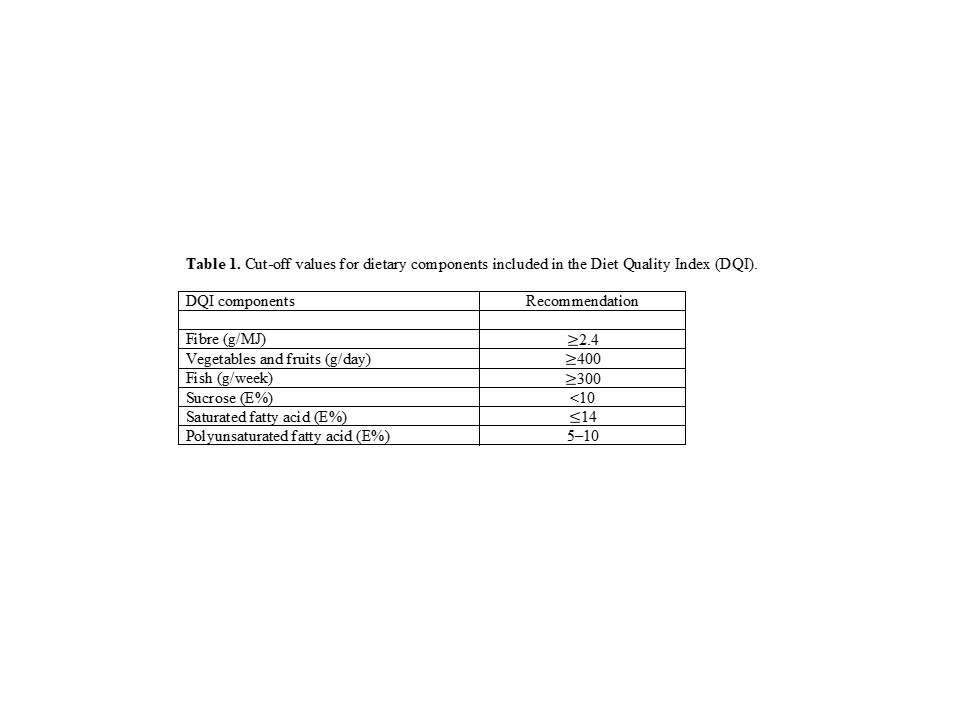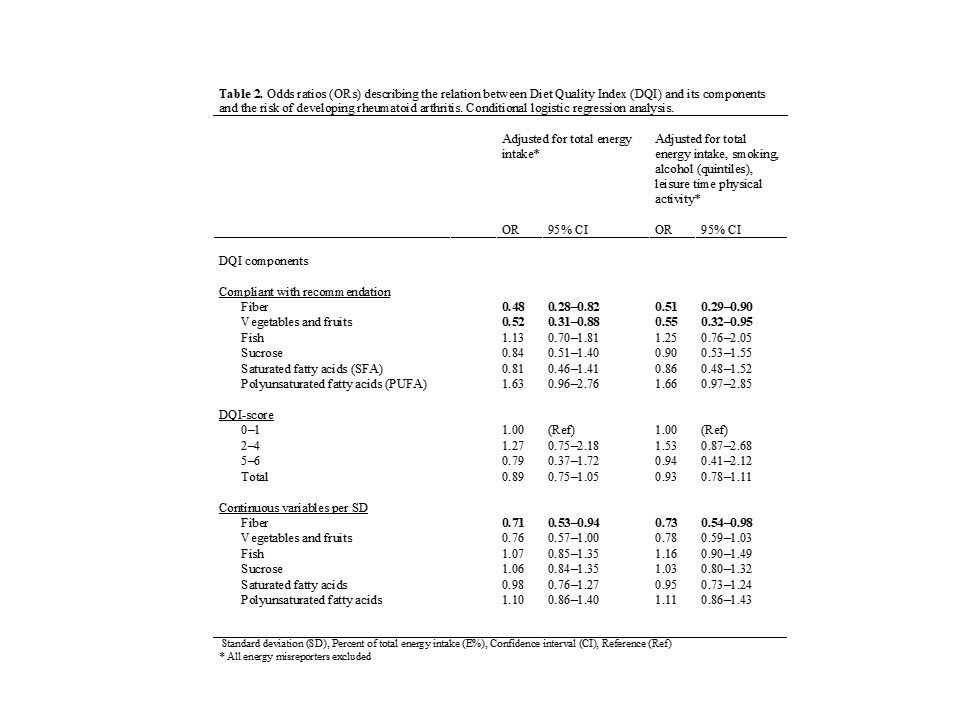Session Information
Date: Sunday, November 7, 2021
Title: Epidemiology & Public Health Poster II: Inflammatory Arthritis – RA, SpA, & Gout (0560–0593)
Session Type: Poster Session B
Session Time: 8:30AM-10:30AM
Background/Purpose: Diet has received attention as a factor possibly contributing to development of rheumatoid arthritis (RA). The aim of this study was to investigate the relation between overall diet quality, diet components, and the risk of RA.
Methods: Participants in a population-based cohort established in 1991-1996 who were subsequently diagnosed with RA were identified through register linkage and validated in a structured process. Four controls for each case, matched for sex, year of birth, and year of inclusion, were selected from the study cohort. The controls were alive and RA-free when the index person was diagnosed with RA. At inclusion, diet was assessed using a seven-day food diary, a diet history questionnaire, and a complementary diet interview.
The validated Diet Quality Index (DQI) has been developed for distinguishing high-quality and low-quality diets by assessing adherence to the Swedish nutrition recommendations from 2005 and the Swedish dietary guidelines. The DQI score ranges from 0 to 6. A score of 1 is assigned to each component where the individual is compliant with the recommendation, i.e. fiber, fruit and vegetables, fish and shellfish, saturated fat, polyunsaturated fat, and sucrose (Table 1).
We applied conditional logistic regression analysis to study the relation between DQI, its components, and RA. The DQI was divided into categories, defined as low (0–1) (reference), moderate (2–4) and high (5–6), the category “low” was set as the reference. All models were adjusted for reported total energy intake, and potential misreporters of total energy intake were excluded.
We designed multivariable models in which we included covariates that have been associated with diet and RA (smoking, alcohol and leisure time physical activity). Interrelationships between dietary variables were assessed using Spearman’s correlation test.
Results: In the study population, 172 RA cases were identified. Greater fiber intake was associated with decreased risk of RA both as dichotomous (i.e. compliant with recommendation or not) and continuous variables, with adjusted odds ratios (ORs) 0.48 (95% CI 0.28–0.82) and 0.71 per SD (95% CI 0.53–0.94), respectively. Furthermore, intake of vegetables and fruit >400 g/day was associated with decreased risk of RA, OR 0.52 (95% CI 0.31–0.88). The DQI was not associated with RA in these models (Table 2).
In multivariable models, associations for fiber and vegetables and fruits remained significant. There were strong correlations between intakes of vegetables and fruits and fiber (r=0.67 for continuous variables and r=0.50 for dichotomous variables). In the final multivariable model, compliance with the recommendation for intake of fibre was associated with lower risk of RA (OR 0.51; 95% CI 0.29–0.90).
Conclusion: In conclusion, fiber intake was independently associated with decreased risk of RA. Fiber intake was highly correlated with intake of vegetables and fruits, which was also associated with decreased risk of RA in multivariable models. No statistically significant associations were seen for DQI with the development of RA. Our results indicate that individual foods, rather than overall diet quality, associate with RA.
To cite this abstract in AMA style:
Bäcklund R, Drake I, Sonestedt E, Nilsson J, Bergström U, Turesson C. Recommended Fiber Intake, but Not Overall Dietary Quality, Is Associated with Reduced Risk of Rheumatoid Arthritis – Results from a Nested Case-control Study [abstract]. Arthritis Rheumatol. 2021; 73 (suppl 9). https://acrabstracts.org/abstract/recommended-fiber-intake-but-not-overall-dietary-quality-is-associated-with-reduced-risk-of-rheumatoid-arthritis-results-from-a-nested-case-control-study/. Accessed .« Back to ACR Convergence 2021
ACR Meeting Abstracts - https://acrabstracts.org/abstract/recommended-fiber-intake-but-not-overall-dietary-quality-is-associated-with-reduced-risk-of-rheumatoid-arthritis-results-from-a-nested-case-control-study/


